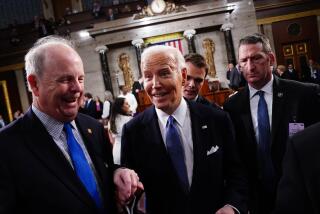But Both Sides Applaud President’s Conciliatory Tone : Democrat Cites ‘Major Mistakes’
- Share via
WASHINGTON — Sen. George J. Mitchell (D-Me.), in the Democratic response to President Reagan’s Iran- contra address, insisted Wednesday that Reagan will have to acknowledge more mistakes before Congress can respond to his call for cooperation in his remaining 17 months in office.
“Before we can deal effectively with the future, there must be accountability for the past,” said Mitchell, who sits on the Senate’s Iran-contra investigating committee.
He contended that there were “major mistakes” made not only with the execution of arms sales to Iran, as Reagan conceded, but with the substance of the policies themselves.
‘Mistake So Grave’
“The sale of weapons to Iran was . . . a mistake so grave that Americans are now risking their lives” while escorting oil tankers in the Persian Gulf, he said. And, despite the swap of arms for three American hostages in Lebanon, he said, further kidnapings have left just as many Americans held hostage now as before the arms sales.
However, Mitchell, who wrote most of his response before receiving a text of Reagan’s address, was quick to say that “there’s much to be done together” on arms control and deficit reduction.
Other Democratic leaders, reacting after watching Reagan’s speech, were more upbeat about it and expressed particular satisfaction with its conciliatory tone.
“I thought he was a contrite President,” said Rep. Tony Coelho (D-Merced), the House Democratic whip. “I thought the tone was right on target, what the American people want. He said he and Congress need to put down the sword and solve the country’s problems. I say amen, let’s do it.”
Strikes Similar Note
A key Republican moderate in the Senate struck a similar note. Sen. William S. Cohen (R-Me.), ranking minority member of that chamber’s Iran-contra panel, praised the President for adopting what he called a “constructive and conciliatory tone” that he said represented Reagan’s determination to “establish a working relationship with Congress.”
Cohen said he hopes “this change in tone and attitude will help the President regain a position of leadership.” He added that “if his words are followed with deeds,” then the new relationship Reagan seeks with Congress “should help restore his leadership in the final months of his presidency.”
House Majority Leader Thomas S. Foley (D-Wash.) echoed Cohen’s sentiments.
“The importance of the speech will not be so much what the President said,” Foley commented, “but what the President does in the coming months. If he in fact does follow a policy of cooperation and conciliation with Congress, we will respond in a positive and affirmative way to his efforts.”
Specifics ‘Disappointing’
Foley said that the speech struck him in a “mixed way.” The positive emphasis on conciliatory relations with Congress, he said, contrasted with specifics that he found “disappointing,” notably Reagan’s renewed proposal for a constitutional amendment requiring a balanced budget.
“As Sen. Mitchell pointed out, the President hasn’t sent one (balanced budget) to us in all the time he’s been President,” Foley said.
Similarly, although Senate Majority Leader Robert C. Byrd (D-W. Va.) said that Congress welcomed the President’s offer of cooperation, he dismissed Reagan’s call for a balanced-budget amendment.
“We do not need to wait for a vote on a balanced budget amendment, which might not be ratified for years,” Byrd said. “What we need is for this President to work with Congress now to attack the triple-digit deficit and the doubling of the public debt, which happened on his watch.”
Pleased at Contra Support
Rep. Henry J. Hyde (R-Ill.), one of the President’s strongest supporters on the House’s Iran-contra committee, said he was particularly pleased that Reagan had voiced continued strong support for the Nicaraguan opposition. But he noted that “how he’s going to do that is rather vague.”
Hyde said he did not think the Iran-contra matter would go away. “However, I don’t think it will inhibit the Congress or the White House with their agendas because people who are probably indicted will not be serving in government,” he added.
Foley, appearing with Hyde on Cable News Network, maintained that the Iran-contra affair probably would not be an issue in the 1988 elections. But he acknowledged that the policy issues it raised would be central to the campaign.
“If all the candidates, as I expect, are going to emphasize the need to work within the rule of law and maintain the responsibility of the President to cooperate with the Congress, I don’t see this as an issue for the future,” Foley said.
‘Appreciate Disclaimer’
Hyde responded with a chuckle, saying: “I appreciate Tom Foley’s disclaimer of any political profit coming from these hearings. . . . I want to believe him, let’s say that.”
Hyde also said that he believes the scandal will not become a political issue because “the mistakes that were made in the Iran initiative and in other areas are really not transferable to the candidates running for the Republican nomination in 1988.”
Although Reagan is moving into the period when presidents traditionally become powerless lame ducks, Hyde said, Reagan has “set out an ambitious agenda of arms control, many other issues, the budget, that will keep him busy and keep the Congress busy.”
“He still is a very potent chief executive,” he said.
More to Read
Get the L.A. Times Politics newsletter
Deeply reported insights into legislation, politics and policy from Sacramento, Washington and beyond. In your inbox twice per week.
You may occasionally receive promotional content from the Los Angeles Times.









